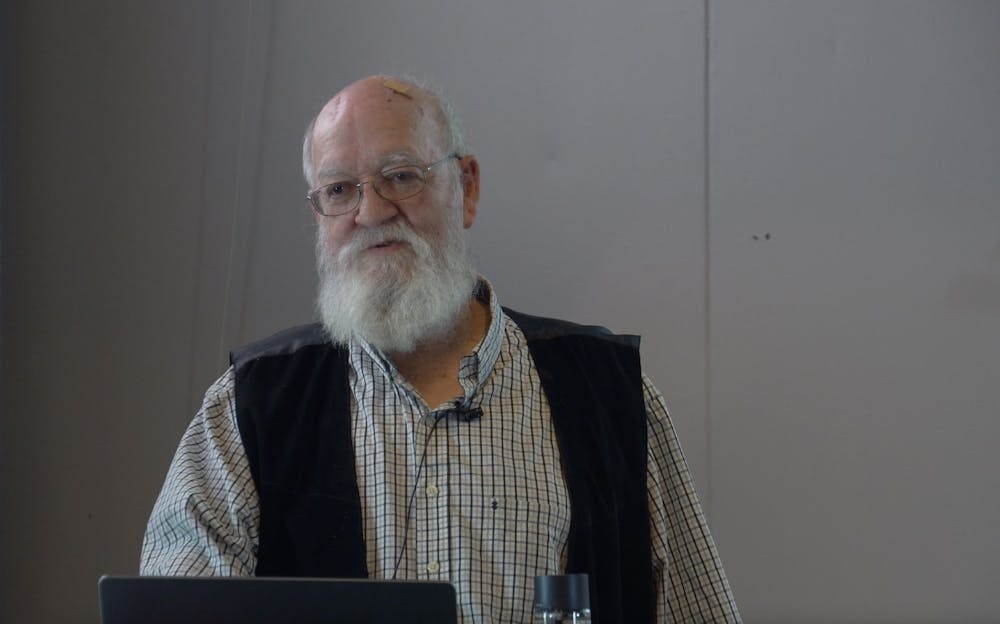Daniel Dennett spoke at the inaugural Hopkins Natural Philosophy Forum on Feb. 6. The talk, titled “How, when and why can we trust our brains?” explored the philosophy of consciousness.
In an email to The News-Letter, Professor of Natural Philosophy Sean Carroll explained that he and the William H. Miller III Professor of Philosophy Jenann Ismael inaugurated the Natural Philosophy Forum to enable rigorous conversations at the intersection of science and philosophy.
Dennett is the Austin B. Fletcher professor of Philosophy and director of the Center for Cognitive Studies at Tufts University. Carroll discussed the choice to invite Denett as the first lecturer of the series.
“We believe that science and philosophy share a common goal of better understanding the fundamental nature of reality, and that certain questions require the tools of each discipline, working in cooperation,” he wrote. “Nobody better embodies this spirit than Daniel Dennett, a distinguished philosopher who has constantly engaged with (and made contributions to) scientific fields such as cognitive science and evolutionary biology.”
Dennett began the talk by stating his intention as discussing current problems not yet solved. He emphasized that the most important aspect of his talk’s title is the word “we.”
“Who is this ‘we’ that wonders whether we trust our brains?” he said. “I don’t want to talk about the first-person point of view. I want to talk about the first-person plural point of view. What can we, working together, know?”
Dennett went on to outline a thought experiment involving waking up in the windowless control room of a robot and your life depending on safely guiding the robot. The room is full of lights and buttons, but you cannot determine their function.
Dennett suggested that the brain is in a “windowless control room” predicament. He stated that we can attribute the brain’s success to magic or science, with science being the correct route.
“Imagining such a control center just postpones the explanation by postulating a homunculus,” he said. “You can’t solve the problem by putting a homunculus in there. That’s just a fantasy, and yet many philosophers and some scientists insist on taking this image seriously.”
Having established an argument against there being a homunculus in the brain, Dennett explained the philosophical question he finds most interesting.
“All the work done by the imagined homunculus... must be distributed around to lesser agencies in the brain. How?” he said. “That, to me, is the most interesting question that I’m working on and that others are working on.”
Dennett then provided some instances of other philosophers rejecting his beliefs about the brain and consciousness. He emphasized that his belief is not that consciousness does not exist, but that it is not what we might think it is.
To illustrate the importance of collective knowledge, Dennett provided the example of similar structures made by a termite colony and a church designed by the architect Antoni Gaudí. Although the structures looked strikingly similar, they were made using entirely different processes.
Dennett explained how these similarities are possible.
“The short answer is this: You can’t do much carpentry with your bare hands, and you can’t do much thinking with your bare brain,” he said. “The termite colony is a bare brain. It doesn’t have any thinking tools... but intelligent designers like us... have well-equipped brains.”
In an interview with The News-Letter, senior Annelisa O’Neal described her appreciation for Dennett’s analogies.
“I especially liked his bit of analogy between termites and neurons,” she said. “I wasn’t expecting his talk to include any sort of commentary relating to cultural evolution or the evolution of cooperation, so that was something unexpected that I really enjoyed.”
The concluding portion of Dennett’s lecture stressed the importance of language in developing the human mind.
“It’s hard to keep in mind how huge the gulf is between animal minds and ours,” he said. “Wildebeests, shoulder to shoulder in the herd, they share a lot, but they can’t share their knowledge the way we can.”
He added that, aside from sharing knowledge, language is an important tool because it allows humans to have complex thoughts.

















